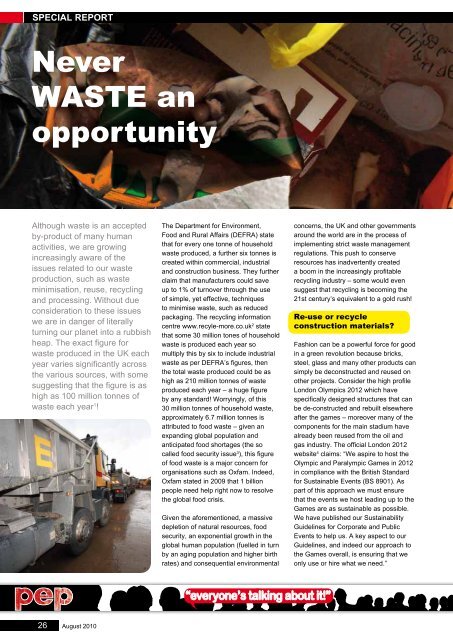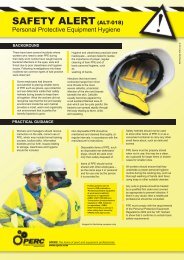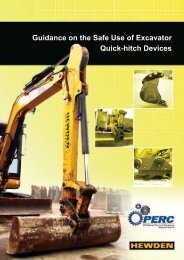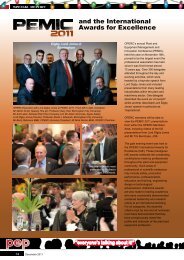the PeoPle - OPERC - Off-highway Plant and Equipment Research ...
the PeoPle - OPERC - Off-highway Plant and Equipment Research ...
the PeoPle - OPERC - Off-highway Plant and Equipment Research ...
You also want an ePaper? Increase the reach of your titles
YUMPU automatically turns print PDFs into web optimized ePapers that Google loves.
SPECIAL REPORT<br />
never<br />
WaSte an<br />
opportunity<br />
Although waste is an accepted<br />
by-product of many human<br />
activities, we are growing<br />
increasingly aware of <strong>the</strong><br />
issues related to our waste<br />
production, such as waste<br />
minimisation, reuse, recycling<br />
<strong>and</strong> processing. Without due<br />
consideration to <strong>the</strong>se issues<br />
we are in danger of literally<br />
turning our planet into a rubbish<br />
heap. The exact figure for<br />
waste produced in <strong>the</strong> UK each<br />
year varies significantly across<br />
<strong>the</strong> various sources, with some<br />
suggesting that <strong>the</strong> figure is as<br />
high as 100 million tonnes of<br />
waste each year 1 !<br />
26<br />
August 2010<br />
The Department for Environment,<br />
Food <strong>and</strong> Rural Affairs (DEFRA) state<br />
that for every one tonne of household<br />
waste produced, a fur<strong>the</strong>r six tonnes is<br />
created within commercial, industrial<br />
<strong>and</strong> construction business. They fur<strong>the</strong>r<br />
claim that manufacturers could save<br />
up to 1% of turnover through <strong>the</strong> use<br />
of simple, yet effective, techniques<br />
to minimise waste, such as reduced<br />
packaging. The recycling information<br />
centre www.recyle-more.co.uk 2 state<br />
that some 30 million tones of household<br />
waste is produced each year so<br />
multiply this by six to include industrial<br />
waste as per DEFRA’s figures, <strong>the</strong>n<br />
<strong>the</strong> total waste produced could be as<br />
high as 210 million tonnes of waste<br />
produced each year – a huge figure<br />
by any st<strong>and</strong>ard! Worryingly, of this<br />
30 million tonnes of household waste,<br />
approximately 6.7 million tonnes is<br />
attributed to food waste – given an<br />
exp<strong>and</strong>ing global population <strong>and</strong><br />
anticipated food shortages (<strong>the</strong> so<br />
called food security issue 3 ), this figure<br />
of food waste is a major concern for<br />
organisations such as Oxfam. Indeed,<br />
Oxfam stated in 2009 that 1 billion<br />
people need help right now to resolve<br />
<strong>the</strong> global food crisis.<br />
Given <strong>the</strong> aforementioned, a massive<br />
depletion of natural resources, food<br />
security, an exponential growth in <strong>the</strong><br />
global human population (fuelled in turn<br />
by an aging population <strong>and</strong> higher birth<br />
rates) <strong>and</strong> consequential environmental<br />
“everyone’s talking about it!”<br />
SPECIAL REPORT<br />
concerns, <strong>the</strong> UK <strong>and</strong> o<strong>the</strong>r governments<br />
around <strong>the</strong> world are in <strong>the</strong> process of<br />
implementing strict waste management<br />
regulations. This push to conserve<br />
resources has inadvertently created<br />
a boom in <strong>the</strong> increasingly profitable<br />
recycling industry – some would even<br />
suggest that recycling is becoming <strong>the</strong><br />
21st century’s equivalent to a gold rush!<br />
Re-use or recycle<br />
construction materials?<br />
Fashion can be a powerful force for good<br />
in a green revolution because bricks,<br />
steel, glass <strong>and</strong> many o<strong>the</strong>r products can<br />
simply be deconstructed <strong>and</strong> reused on<br />
o<strong>the</strong>r projects. Consider <strong>the</strong> high profile<br />
London Olympics 2012 which have<br />
specifically designed structures that can<br />
be de-constructed <strong>and</strong> rebuilt elsewhere<br />
after <strong>the</strong> games – moreover many of <strong>the</strong><br />
components for <strong>the</strong> main stadium have<br />
already been reused from <strong>the</strong> oil <strong>and</strong><br />
gas industry. The official London 2012<br />
website 4 claims: “We aspire to host <strong>the</strong><br />
Olympic <strong>and</strong> Paralympic Games in 2012<br />
in compliance with <strong>the</strong> British St<strong>and</strong>ard<br />
for Sustainable Events (BS 8901). As<br />
part of this approach we must ensure<br />
that <strong>the</strong> events we host leading up to <strong>the</strong><br />
Games are as sustainable as possible.<br />
We have published our Sustainability<br />
Guidelines for Corporate <strong>and</strong> Public<br />
Events to help us. A key aspect to our<br />
Guidelines, <strong>and</strong> indeed our approach to<br />
<strong>the</strong> Games overall, is ensuring that we<br />
only use or hire what we need.”
















